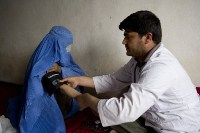 Afghanistan's primary health care strategy focuses on mobilizing human and financial resources to accelerate implementation of the basic package of health services, supported by a standardized essential package of hospital services.Among its many achievements, the Ministry of Public Health of Afghanistan, with the technical support of WHO, developed a health care sector strategic plan (2011–2015) and national health policy (2012–2020) to guide health development and ultimately ensure the provision of basic health services to the majority of the country’s population. Over the last 10 years the coverage of primary health care services has steadily been increasing in Afghanistan, and this has led to improvements in the delivery of services.
Afghanistan's primary health care strategy focuses on mobilizing human and financial resources to accelerate implementation of the basic package of health services, supported by a standardized essential package of hospital services.Among its many achievements, the Ministry of Public Health of Afghanistan, with the technical support of WHO, developed a health care sector strategic plan (2011–2015) and national health policy (2012–2020) to guide health development and ultimately ensure the provision of basic health services to the majority of the country’s population. Over the last 10 years the coverage of primary health care services has steadily been increasing in Afghanistan, and this has led to improvements in the delivery of services.
WHO provides technical support to the Ministry of Public Health in many areas, including: emergencies, communicable and noncommunicable diseases, health system governance, health financing, research, private sector regulation, nutrition, human resources, health promotion and community empowerment.
To increase equitable access to quality health services, WHO also provides technical support to create an enabling environment for the production and availability of quality health care and pharmaceuticals.
Expanding access to services
Afghanistan's commitment to primary health care is emphasized in the country's national health policy. The primary health care strategy of the Ministry of Public Health focuses on mobilizing human and financial resources to accelerate implementation of the basic package of health services, supported by a standardized essential package of hospital services.
A great achievement of the health sector has been the provision of the basic package of services to 82% of the population. Plans are now underway to expand access through implementation of community-based initiatives and by increasing the number of primary health facilities. Despite a large expansion in the number of functioning facilities, only 54% of the rural population lives within one hour’s travel of a health facility. In some provinces this figure is even lower reflecting the difficult terrain of Afghanistan and its dispersed population.
Challenges
Some of the challenges faced by Afghanistan include: insecurity; widespread poverty, shortage of female health workers; limited and inadequate resources and operational capacity; high rates of staff turnover and brain drain; and a fragmented health care system. Opportunities to overcome these challenges do, however, exist in the form of donor interest and funding opportunities and a supportive and committed leadership.
Partners
WHO's main partners in primary health care include: the Ministry of Public Health, nongovernmental organizations implementing the basic package of health services, USAID, European Union, World Bank, GAVI Alliance and the Global Fund to Fight AIDS, Tuberculosis and Malaria.
Activities are coordinated though a consultative group on health and nutrition, a health system steering committee, the Country Coordinating Mechanism and various other taskforces and working groups.








